Wrapping Up the 2022 Chicago Film Festival
If I had to sum up this year’s Chicago International Film Festival with one word, it would definitely be “underwhelming.” This year’s programming left much to be desired, especially in its virtual programming, which was scaled back considerably from previous years. This, in my opinion, is decidedly a step backwards.
While I understand the logic behind screening many of the festival’s offerings (particularly its best selections) in theaters as a means to encourage audiences to return to moviehouses, this doesn’t seem to put much stock in the fact that viewers’ movie-watching habits have fundamentally changed since the onset of the COVID-19 pandemic. Many cinephiles are still reluctant to leave home to watch movies, and offering them virtually has been a brilliant solution to offset this hesitancy. Imagine that – this practice made some exceedingly tasty lemonade from a huge pile of big sour lemons.
Streaming festival offerings also created new audiences and afforded new viewing opportunities for these pictures. Viewers were no longer locked into set presentation times, and, in many cases, they didn’t even have to be in the same geographic locale where the festival was taking place. It also made it possible to watch more festival offerings given the added convenience factor. In light of that, consider the following comparison: Think of what on-demand streaming afforded moviegoers who were previously locked into rigid cable TV schedules. They could now watch what they wanted, when they wanted it. Festival streaming essentially enabled the same. Isn’t that progress for organizations supposedly striving to expand the scope of the artform?
Chicago is not the only city whose festival programming is undergoing such changes, and that’s disappointing as well. In addition to scaling back the number of cinematic offerings, the quality of what’s been made available virtually has left something to be desired, too. If the organizers of these events truly want to maximize their audiences for their offerings (especially those they consider the cream of the crop), they should be doing more – not less – to broaden the screening opportunities for their films. If they don’t, they could suffer the effects of a double whammy – a continued perception that festival screenings are not readily accessible (except to the select audience members who deliberately go out of their way to make the effort to see them) and a perhaps permanent loss of viewership among moviegoers whose basic screening habits have changed for good.
With that said, here’s a recap of what I watched, both virtually and theatrically – a much smaller number of films compared to recent years – and what I thought of them.

“No Ordinary Campaign” (USA) (5/5); Letterboxd (5/5)
Getting the word out about a worthy cause is often an uphill battle. And, when that cause is one where those affected by it have a tremendous sense of urgency associated with it, there’s no time to lose. So it is with those afflicted with ALS, the degenerative neuromuscular illness better known as Lou Gehrig’s Disease, a condition that has historically had a 100% mortality rate, usually within two to five years. What’s more, it’s a disease whose victims have often been ignored in terms of adequate research funding, affordable caregiving options and available clinical trials, circumstances that former Assistant US Attorney Brian Wallach found unacceptable when he was diagnosed at age 37. Together with his wife, Sandra, and a band of fiercely devoted supporters, Wallach launched a broad-based campaign to change the ballgame for ALS patients, particularly in terms of eliminating the financial and government policy roadblocks that have traditionally kept them from advancing their cause within realistic time frames. Director Christopher Burke’s latest documentary feature details Wallach’s determined efforts to raise the profile of this devastating condition and to secure changes in the way it’s addressed legislatively and by government agencies like the FDA. The film’s powerfully persuasive message makes a strong, heartfelt case for support of this cause but without becoming manipulative or maudlin. It presents a detailed chronicle of Wallach’s campaign, backed by a series of interviews with ardent backers like President Barack Obama, Sen. Dick Durbin (D-IL), Rep. Mike Quigley (D-IL), and Chan Zuckerberg Foundation philanthropists Priscilla Chan and Mark Zuckerberg, as well as footage of joint ventures conducted with Team Gleason colleague and fellow ALS sufferer, former NFL star Steve Gleason, subject of the inspiring documentary “Gleason” (2016). This fine offering will definitely move you, not only with a sense of compassion, but also with an unexpected sense of humor, qualities that are assured to fill viewers with a tremendous sense of hope – almost as much, in fact, as Wallach holds out for himself and those like him.

“Before, Now & Then” (“Nana”) (Indonesia) (4.5/5); Letterboxd (4.5/5), Imdb.com (9/10)
The search of happiness can be an elusive one, especially when confronted by challenges on multiple fronts, even for those who ostensibly appear to be superficially contented and well off. Such is the fate of a seemingly comfortable middle-aged housewife (Happy Salma) in 1960s Indonesia, whose first husband (Ibnu Jamil), a military officer, mysteriously disappeared and whose second spouse (Arswendy Bening Swara), a plantation owner, is having a less-than-veiled affair, all of which is set against the country’s political unrest of the period. It’s a scenario further complicated by her willingness to capitulate to her circumstances and by the secrets she keeps from virtually everyone. Surprisingly, though, when her husband’s mistress (Laura Basuki) moves in with the family, the two women strike up an unlikely friendship, one that leads to some difficult but unexpectedly pleasant developments. Writer-director Kamila Andini’s latest feature outing tells a slowly unfolding but ever captivating tale with surprises awaiting around every corner. The deeply heartfelt performances of Salma and Basuki reach out and grab viewers throughout, portrayals all the more enlivened by the film’s mesmerizing soundtrack, gorgeous cinematography and inventive, revelatory surreal dream sequences. Admittedly, the pacing at times could be a little more up-tempo, but this is a small price to pay for an otherwise thoroughly engaging watch, one of the Chicago Film Festival’s surprise charmers.
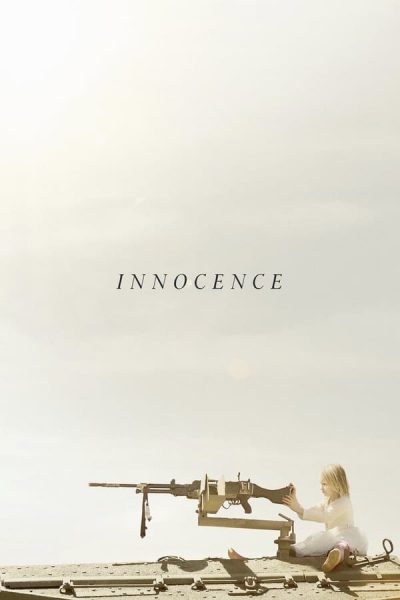
“Innocence” (Israel/Denmark/Iceland/Finland) (4.5/5); Letterboxd (4.5/5), Imdb.com (9/10)
The loss of innocence – in virtually any context – is a disappointing, heart-wrenching affair. But, when such a tragedy is writ large, as it is in director Guy Davidi’s poetic but profoundly sad and quietly infuriating documentary about the Israeli government’s heavy-handed indoctrination of its youth for its compulsory military service program, that message comes through with an undeniably enraging impact. With virtually no alternate option available for conscientious objectors – of which there is a steadily growing movement among the country’s young Jewish population – 18-year-old men and women are forced into either enlisting or facing disgrace and/or imprisonment. And those who are unable to devise a suitable alternative frequently resort to desperate acts to take away the personal pain they suffer in trying to comply with their obligations but are incapable of doing so. Told through home videos and voice-over narrations of the writings of those who tried to fit in but couldn’t, intercut with footage from training exercises, government propaganda and battlefield images, the film presents a chilling portrait of an inflexible, merciless military and bureaucracy that seek to brainwash the country’s youth into service, regardless of what their conscience will allow or even whether they’re fundamentally capable of carrying out the role of soldiers. As one objector poignantly observes, if the youth of Israel can’t change a system like this, who can? And, to expect otherwise is unrealistic, leading only to its perpetuation, of which youthful enablers are, unfortunately, willingly contributing to. That’s a strong statement – and one that rings true throughout this powerful release.

“How to Blow Up a Pipeline” (USA) (4/5); Letterboxd (4/5), Imdb.com (8/10)
Do the ends truly justify the means? That’s an age-old question that has been asked countless times in countless contexts, but what’s the answer? It’s a decision left open for viewers to ponder in this taut ecothriller about a group of zealous environmental activists who plan to blow up a west Texas pipeline in an effort to draw attention to such issues as global climate change and public health considerations. Writer-director Daniel Goldhaber’s second feature skillfully combines elements of various cinematic genres, including Westerns, heist films, political thrillers and ecological dramas like “The East” (2013), but it does so in some highly unexpected ways. In particular, this well-constructed, smartly produced offering is heavily character-driven, presenting genuinely compelling back stories about its crew of protagonists told through a series of strategically placed flashbacks. What’s more, the picture’s gorgeous cinematography, superb editing, fine performances and intense original score all lend themselves to a splendidly crafted package, certainly much more than what one would typically expect out of a low-budget indie. Of course, these strengths aside, this still leaves open the question about the impact of this story. What kind of message does it send? Is it appropriate to make and release a picture that depicts a subversive venture such as this? Can the kind of collateral damage at stake here be justified, be it even theoretically told through a work of fiction? But, then, can society continue to willfully ignore the kinds of environmental damage that are being allowed to unfold without taking any meaningful action? And what of the law enforcement questions involved in a scenario like this? “Pipeline” gives viewers ample food for thought while simultaneously reminding us that the clock is ticking on these issues – and that we had better start making some serious decisions soon.
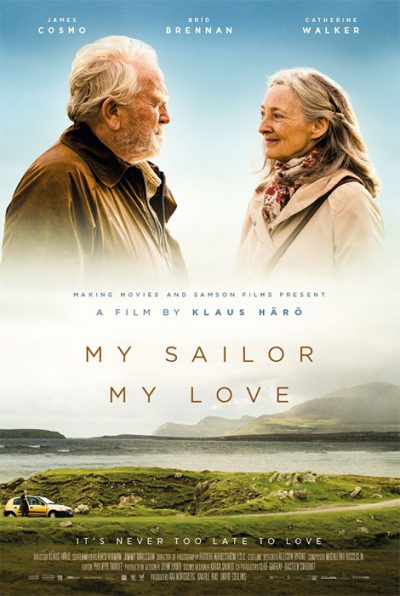
“My Sailor, My Love” (“Rakkaani merikapteeni”) (Finland/Ireland) (4/5); Letterboxd (4/5), Imdb.com (8/10)
When a retired, curmudgeonly, self-centered Irish sea captain (James Cosmo) has trouble caring for himself, his overprotective, controlling daughter (Catherine Walker) hires a new housekeeper (Brid Brennan) to tend to his needs, a move the fiercely independent protagonist initially resents. However, before long, the once-tentative relationship blossoms into something more substantial, a move the skipper’s daughter questions and grows to resent. So how will this fundamental dilemma be resolved? That’s the central question raised in director Klaus Härö’s latest effort, a well-crafted, if occasionally predictable, romantic drama reminiscent of the similarly themed “Nobody Has to Know” (2021). Set against the sweeping Irish seacoast, this beautifully photographed backdrop provides the perfect stage for this heartfelt saga, one that verges on a tearjerker at times but never slides into a sappy, melodramatic, manipulative hanky fest. In large part this is due to the restrained but powerful performances of Cosmo and Brennan, who keep their characters real without becoming sentimental, histrionic caricatures. Add to this a finely polished soundtrack, and you’ve got a quality cinematic offering that merits a serious look for a variety of well-deserved reasons.

“Somewhere Over the Chemtrails” (“Kdyby radši hořelo”) (Czech Republic) (3.5/5); Letterboxd (3.5/5), Imdb.com (7/10)
Paranoia has a habit of spreading like wildfire. So it is in this satirical dark comedy about the fear-mongering that explodes in a small Czech Republic village when a van crashes into the town square during an Easter celebration, an incident that prejudiced locals hurriedly chalk up to a terrorist attack. As the contrived explanation spreads, the townsfolk’s paranoia about other conspiracy theories blossoms as well, reaching a fever pitch where everyone is acting irrationally and creating more needless havoc than even the worst assault might have caused – as if that were even at fault to begin with. Writer-director Adam Koloman Rybanský’s debut feature reveals the work of a filmmaker with considerable promise, though this effort could use some shoring up to live up to that potential. Specifically, the picture could stand to pick up the pacing somewhat, living up to the screwball comedy that a vehicle like this was truly meant to be. Also, in conveying its message about the dangers of ignorant, undue discrimination, the story starts to get weighed down by its own heavy-handedness, putting a damper on a lot of the innate lunacy that makes the film’s premise work. Still, the picture is not without its share of fun and laughs, qualities that make for a flawed but nevertheless worthwhile view.

“Vicenta B.” (Cuba/France/USA/Colombia/Norway) (3.5/5); Letterboxd (3.5/5), Imdb.com (7/10)
Who does a seer turn to when she needs help? Such is the lot of Vicenta B. (Linnett Hernandex Valdes), a respected Cuban spiritual advisor who sincerely helps many people in need but who feels eminently helpless when she suddenly loses her ability to divine the mystical information she’s so used to readily sharing with them. In writer-director Carlos Lechuga’s third feature outing, the filmmaker explores the mysteries of this esoteric practice and what it means both for those who engage in it and those who seek its special wisdom. The picture raises questions for those on both sides of the equation, especially when it comes to matters like knowing when to help and when to step back, the responsibilities borne by both seekers and seers, and learning how to understand those who truthfully want help and those who don’t. It also examines the transitions that individuals go through in their lives, particularly at the crucial turning points of middle age, as well as what those adjustments mean. “Vicenta B” admittedly meanders a bit and has occasional pacing issues, but, as an offering that takes a rare realistic look at this subject matter, this release genuinely shines, wiping away a lot of the nonsense and misinformation often depicted in films like this. We all need help from time to time, including those who provide it, and this production confirms that with grace, sensitivity and honesty.
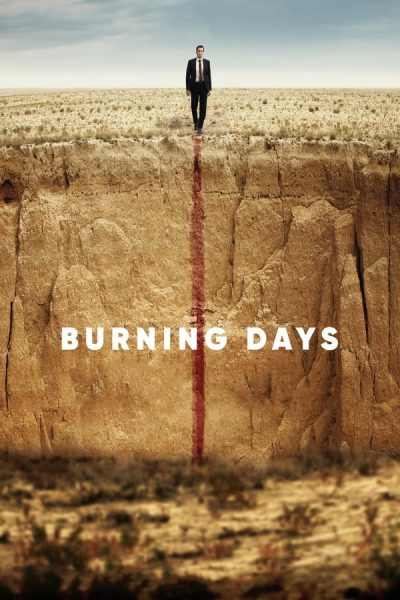
“Burning Days” (“Kurak Günler”) (Turkey/France/Germany/Netherlands/Greece/Croatia) (3/5); Letterboxd (3/5), Imdb.com (6/10)
When an idealistic young prosecutor (Selahattin Pasali) is assigned to a rural Turkish community to try a criminal case involving serious allegations involving a major infrastructure project, he quickly finds himself in over his head. Circumstances soon place him in a thorny situation where his credibility, objectivity, reputation and personal integrity are all put at risk, jeopardizing not only his handling of the case, but also his career and future. Unfortunately, as generally compelling as the narrative is at the outset, writer-director Emin Alper’s overlong saga becomes a little too convoluted for its own good. One can’t help but ask, is it a political film? A thriller? A crime story? A crisis of conscience? The film plays like it tries to incorporate some of all of these qualities in an attempt to tell a story that throws curve balls at viewers to keep them guessing. But the picture seems to lose its way in doing so, not quite sure how to wrap things up, especially when the supposedly astute big city prosecutor comes across as unbelievably naïve and clueless. These failings regrettably undercut the production’s fine performances and superb cinematography, qualities that could have helped to make this release a better offering had they been backed by a better story and script. Indeed, in the end, it’s the audience that gets burned by this one.

“Paloma” (Portugal/Brazil) (3/5); Letterboxd (3/5), Imdb.com (6/10)
When a pre-op transexual woman (Suzy Lopes) announces that she wants to marry her boyfriend (Ridson Reis) in a traditional Catholic church wedding, she’s called foolish and unrealistic for thinking that such a ceremony would be possible in the small, conservative rural Brazilian community where she lives. Even her loving beau thinks the idea is ludicrous and tries to discourage her from pursuing the idea. But Paloma’s determined to follow through on her plan, no matter what the cost, either financially or in terms of public reaction. In writer-director Marcelo Gomes’s latest, the filmmaker presents a fictionalized version of a fact-based story that has its genuinely moving moments of happiness and disappointment, though the narrative feels padded at times, incorporating extraneous incidents that don’t quite make sense and that, regrettably, bear out the concerns of those who tried to dissuade the would-be bride. “Paloma” has frequently been compared to another Latin American trans-oriented release, the Oscar-winning drama “A Fantastic Woman” (2017), though that film has it all over this production, one that tries hard to tell a compelling and convincing story but that ultimately comes up short. Winner of the Silver Q-Hugo Award in the festival’s Out-Look Competition.
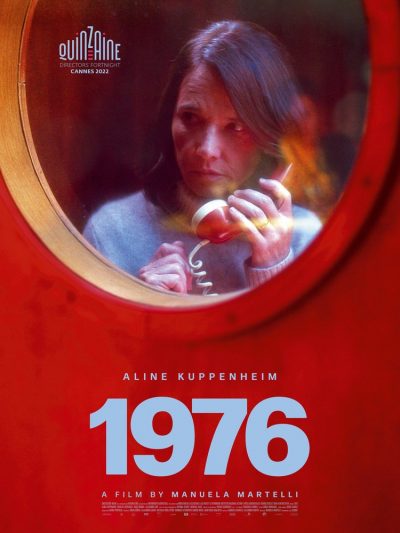
“Chile 1976” (a.k.a. “1976”) (Chile/Argentina/Qatar) (2/5); Letterboxd (2/5), Imdb.com (4/10)
What should have been a tense, claustrophobic look at life in 1976 Chile shortly after the overthrow of the democratically elected Allende administration and the imposition of the hard-line Pinochet regime is, unfortunately, a watered-down, meandering, unfocused tale that never fully attains its goal. Writer-director Manuela Martelli’s story of a middle-aged doctor’s wife (Aline Küpperheim) who risks her own safety to care for a wounded insurgent (Nicolás Sepúlveda) in hiding never really catches traction, filling its narrative with endless, unexplained, underdeveloped plot incidents and a woeful lack of character development, including that of the protagonist, whose motivations are never adequately explained but merely hinted at with such subtlety as to be virtually meaningless. By the time viewers reach the film’s end, they’re more left with an unsatisfying “Oh” rather than a throat-clutching “a ha!” A true disappointment given the subject matter this production had to work with.

“Band” (Iceland) (1/5); Letterboxd (1/5), Imdb.com (1/10)
So is this real or real fake? It’s hard to tell when watching this “documentary” about an all-female pop group trying to make it big at middle age with their own style of Björk-esque Icelandic performance art/rock music. Writer-actor-director Álfrún Örnólfsdóttir, one of the would-be aspiring musical artists, who slips back and forth in front of the camera, tries to chronicle a story where it’s difficult to know where authentic ambition leaves off and bona fide spoof begins, making it difficult for viewers to know what to believe is “real” and what’s made up. That deliberate ambiguity puts this offering in a category by itself, but it’s hard to know when viewers are supposed to laugh or lament. If it’s genuine, it tells a pathetically sad story of a woeful group of performers; if it’s not, it’s an overly silly mockumentary that often tries too hard and wears out its welcome rather quickly. But, as it drones on and on, it’s unlikely anyone is going to care, even by the end of its relatively scant 1:27:00 runtime. Indeed, sometimes trying too hard to prove one’s cleverness proves nothing, as is very much the case here.

“Rounding” (USA) (1/5); Letterboxd (1/5), Imdb.com (2/10)
I suppose there’s a story somewhere inside this medical drama/horror offering, but I’ll be damned if I can find it. Writer-director Alex Thompson’s second feature outing is a plodding, dull, meandering mess in which viewers wait patiently for something to happen and nothing ever does. When a brilliant young medical resident (Namir Smallwood) suffers a breakdown after losing a patient, he transfers to a small town hospital for a second chance, upon which he becomes obsessed with the mysterious symptoms of a respiratory patient (Sidney Flanigan). What follows is an unorganized collection of vague (and unscary) surreal images, tiresome dialogue laden with detailed medical jargon, unexplained and implausible plot developments, and a story that ultimately goes nowhere, one that even requires an explanation by one of the characters (Michael Potts) to enlighten the audience of what supposedly just happened. “Rounding” is a phenomenal waste of time that fails to live up to any of its hype – or potential.
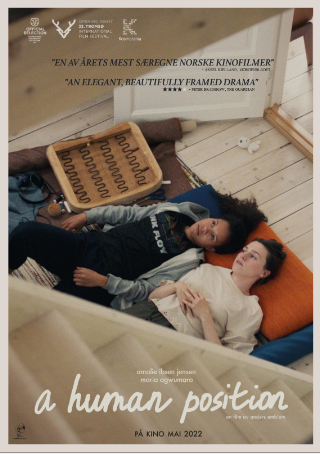
“A Human Position” (Norway) (0.5/5); Letterboxd (0.5/5), Imdb.com (1/10)
Billed by some as “a love letter to the banality of life,” this utterly pointless offering could just as easily be billed as “a love letter to the banality of pretentiously esoteric filmmaking.” Writer-director Anders Emblem’s second feature follows the life (if you can call it that) of a bored journalist (Amalie Ibsen Jensen) living in the Norwegian seaport of Ålesund, reporting mostly on fluff pieces and minor news stories. She lives a reasonably comfortable life with her girlfriend (Maria Agwumaro) while recovering from an undisclosed medical procedure, spending much of her free time refurbishing chairs, doting on her cat and playing board (or is it bored?) games. But, when she stumbles upon a story involving the unexplained disappearance of a foreign asylum seeker, her work gives her life new meaning – or so the film’s production notes claim. The fact is, there’s really no telling that anything has changed with this revelation, given that the picture’s tone and style remain just as flat and uninteresting at this juncture as they do at the outset and throughout the entire duration of this unbearably tedious slog. The protagonist’s deadpan performance is a genuine snooze, and the film’s countless overlong incidental exterior shots supply enough cinematic padding to try the patience of even the most tolerant viewer. But, above all, given how banal real life truly can be, do we honestly need a longwinded cinematic tribute to it? This one is easily skipped – a phenomenal waste of time, energy and talent, not to mention celluloid. Don’t waste yours watching this.
Copyright © 2022, by Brent Marchant. All rights reserved.



